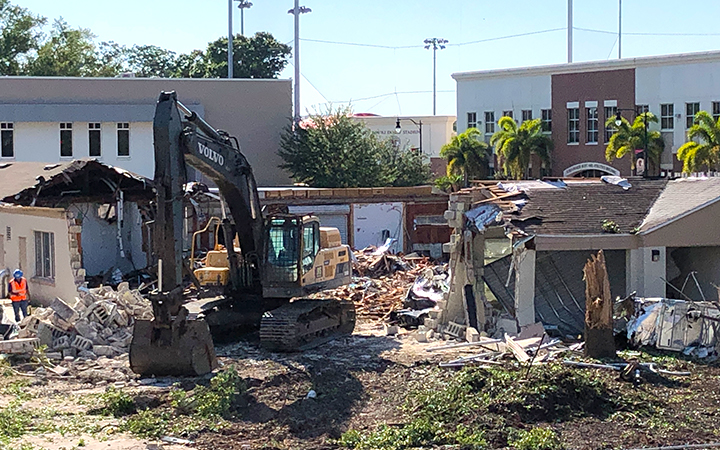
The UTampa campus is transforming, and this page is an insider's look to keep our Spartans and the community informed. The campus is constantly evolving and growing, with approximately $575 million in new construction since 1998.
The Grand Center is a multi-story (10), multipurpose building that serves as a dynamic hub for academic, cultural and social engagement, offering innovative spaces for learning, collaboration and community building. The building includes a residence hall, parking garage, Sky Park, classrooms, faculty and staff offices and a Starbucks.
At over 500,000 square feet it is the largest building on the UTampa campus.
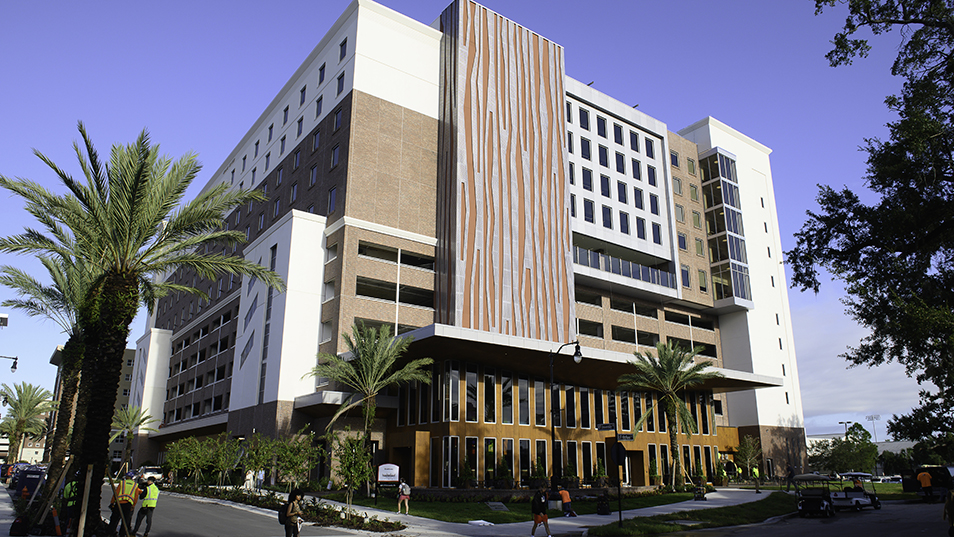
Construction of the Grand Center started in 2022, and it opened in late August 2024, with the following features:
- Five stories of residence hall space that houses nearly 700 students;
- A parking garage for more than 450 cars that includes 22 electric vehicle chargers;
- Office space for the Southard Institute for Sales Excellence, the Office of Access and Community Programs and International Programs Office;
- A Student Veterans Lounge;
- Five active learning classrooms
- 64 offices for faculty and staff;
- A Starbucks café;
- A bicycle storage area that includes charging stations for electric bikes, lockers and a repair station;
- A unique, green Sky Park space designed to promote wellness and community engagement.
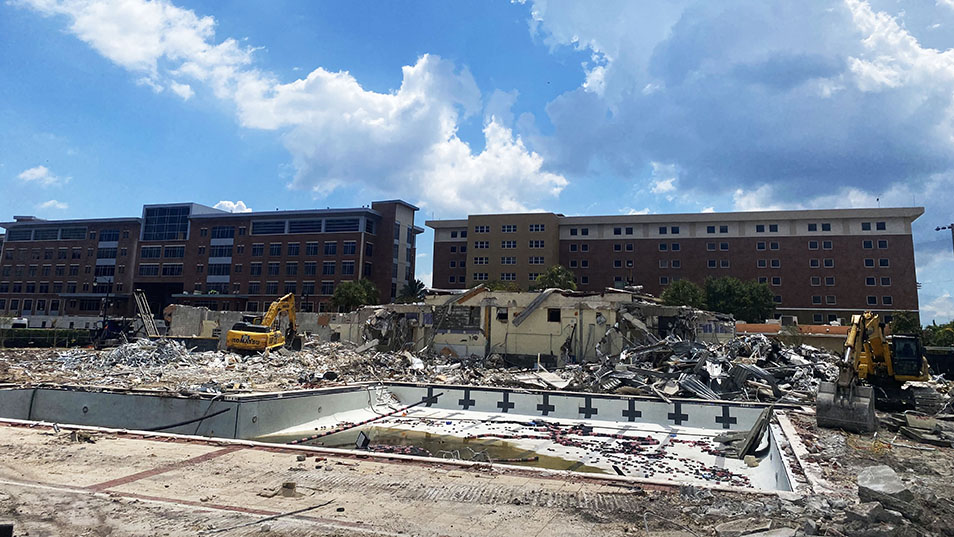 The demolition of the Walker Hall pool took place in May 2022 with construction on the new building soon following.
The demolition of the Walker Hall pool took place in May 2022 with construction on the new building soon following.
The Ars Sonora was completed in 2022, but was in the making for over two decades.
John Sykes first expressed interest in adding bells to the Sykes Chapel and Center for Faith and Values in 1997, according to a University timeline of the Ars Sonora.
A team of consultants and UTampa staff composed of engineers, contractors, lighting specialists, fountain designers and other professionals worked for several years to bring the Ars Sonora to campus.
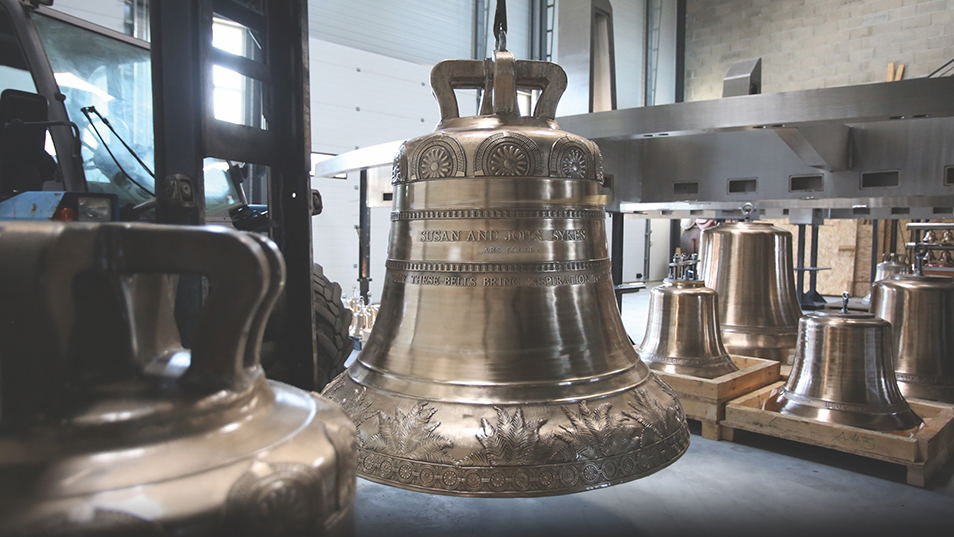
A bell in the Paccard Bell Foundry in France.
In 2010, the finished chapel structure included rooms for the Ars Sonora keyboard, as well as vertical windows for viewing of the future bell tower.
The bells were constructed at the Paccard Bell Foundry in Annecy, France.
The bells are electronically connected to a piano keyboard that can be played from three locations on campus, and each key controls a dynamic striker on a particular bell. Each bell is individually designed to play a specific note.
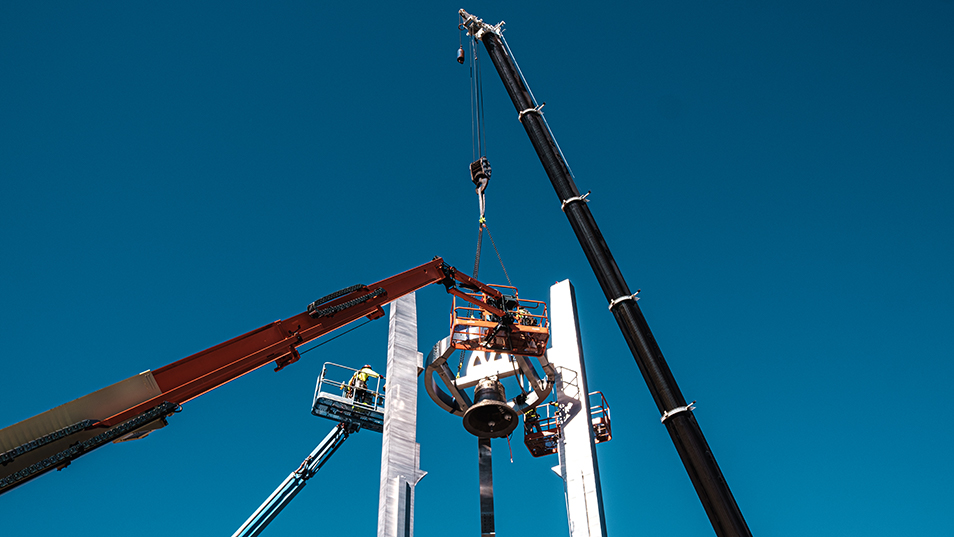
Installation of a bell on the The Susan and John Sykes Ars Sonora.
The Ars Sonora, which has 63 bells, is reinforced with 18 concrete drilled piers and is able to withstand up to 160-mile-per-hour winds and more. The sculpture spans 105 feet in the air.
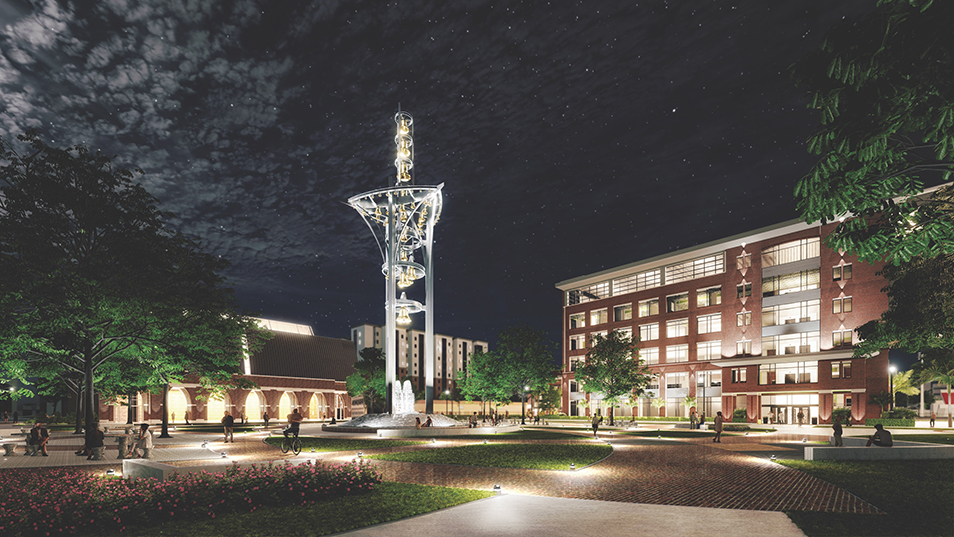 A rendering of The Susan and John Sykes Ars Sonora at night.
A rendering of The Susan and John Sykes Ars Sonora at night.
Phase I of construction began in September 2016 as a two-story, 40,000-square foot facility that planned to house exercise programs, personal training and evaluation, wellness and nutrition programs, intramurals, recreation activities, club sports, as well as some exercise related laboratory and research activities.
Phase II, an expansion of the Fitness Center began in October 2020. Phase II included a two-story building which included the addition of more workout and exercise space, along with a new aquatic center, a functional training space, beach volleyball complex and three basketball courts with mini stadiums for all courts, as well as academic classrooms including two 70-seat classrooms, faculty offices, study and laboratory spaces.
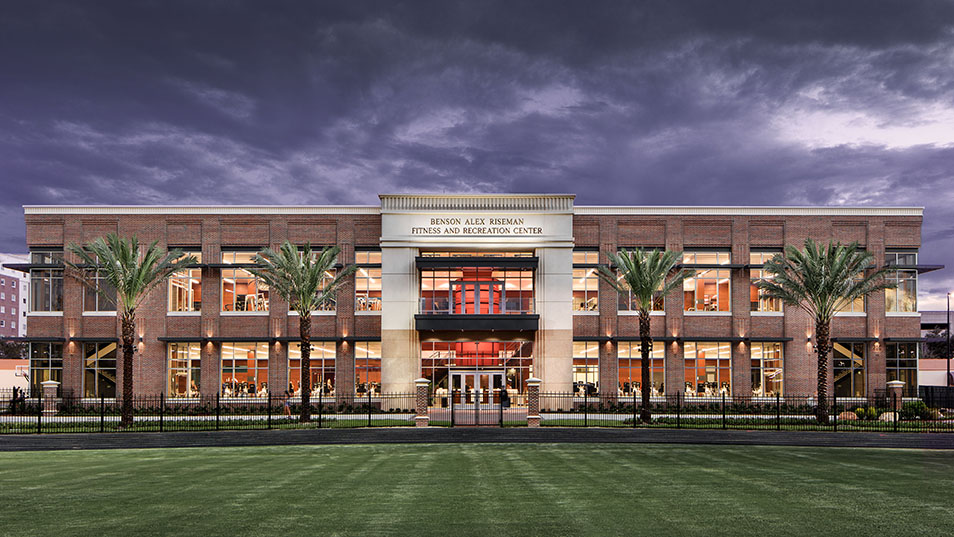
The aquatic center is 32,000 square feet with an 11-lane, 25-yard competition-sized pool, a recreational pool and a hot tub.
The area will also include Spartan swim team offices and locker rooms and facilities for UTampa coaches. A separate two-story pool building, the Benson Alex Riseman Pool House features a large viewing platform and visiting team facilities.
The beginning of the second phase was boosted by a large gift from Benson Riseman '78, a UTampa alumnus and longtime supporter of the University. As a result, the completed facility will be named the Benson Alex Riseman Fitness and Recreation Center.
The entire complex including the aquatic center and courts measures more than 128,000 square feet.
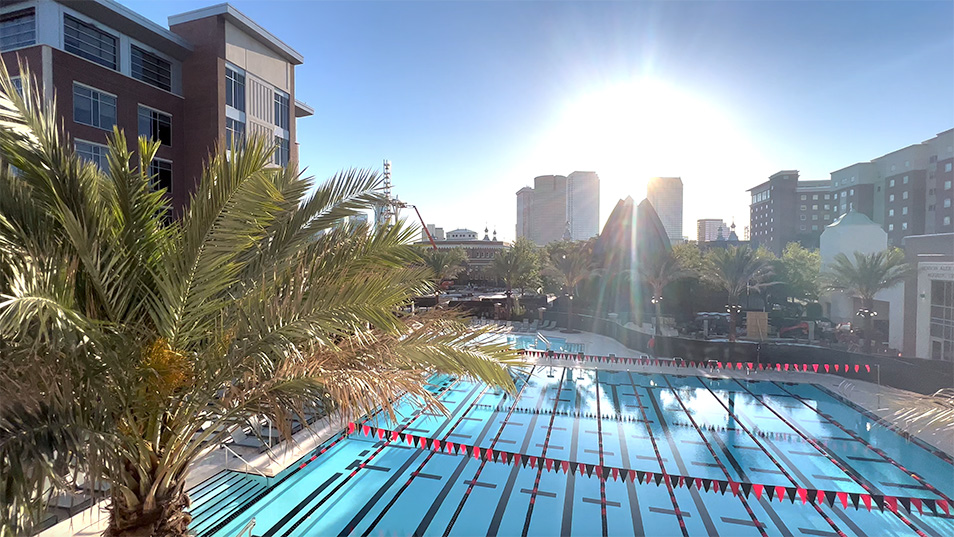
The Riseman Center has an 11-lane, 25-yard competition-sized pool.
The building is UTampa’s seventh LEED-certified building.
A grand opening was held with a brief ceremony and tours. Riseman and his entire family traveled from Las Vegas to attend the grand opening on March 21, 2022 of the Phase II expansion.
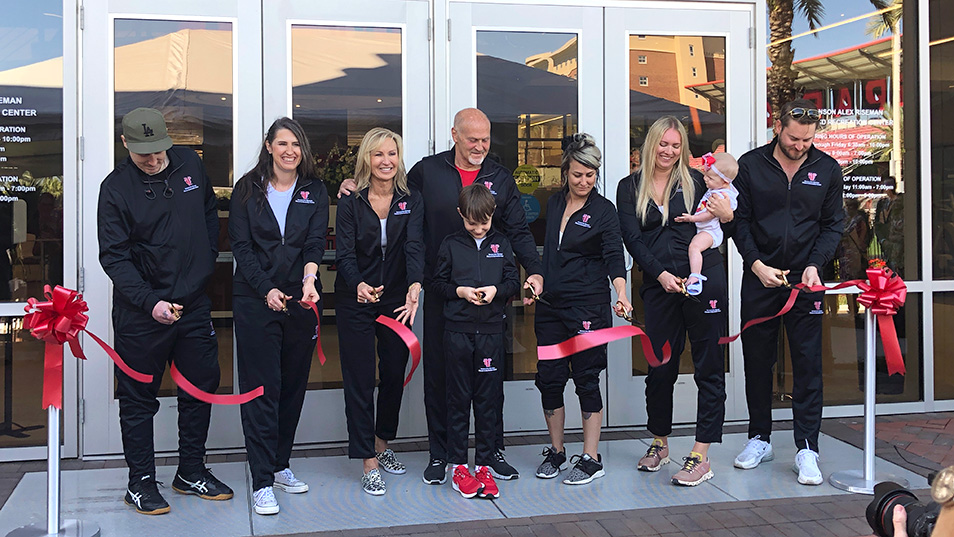
The Riseman family cuts the ribbon at the grand opening of the Benson Alex Riseman Fitness and Recreation Center.
The Ferman Center for the Arts, which opened Spring 2021, provides a creative and transformative space for the fine and performing arts departments. Students studying music, art, design, speech, theatre, dance, communication, philosophy and film will have access to four-stories of a visual and acoustic showcase.
The Ferman Center for the Arts building, named in honor of the Ferman family – longtime supporters of the University – includes a recital hall, black box theater, classrooms, practice rooms, art and dance studios, faculty and administrative offices, student study spaces and much more.
The 90,000-square-foot building located at the corner of North Boulevard and Spaulding Drive is named after the Ferman family, who have been involved with the University for 70 years.
Inside the building is a 200-seat, acoustically-tuned theatre, sound-insulated music classrooms, practice rooms, recording studios, and a black box theater.
The building also has a courtyard area for casting metal or ceramic art, a sculpture studio and a wood/metal fabrication shop.
UTampa’s President Ron Vaughn said the Ferman Center attracts talented students and faculty to UTampa and is a place where they can continue to break artistic boundaries.
“The Ferman Center has also solidified UTampa’s place as a major cultural contributor to the exciting downtown Tampa arts community,” he said.
The Center for Speech is located inside the Ferman Center for the Arts, as well as study and meeting spaces, and faculty offices and lounges.
The building will be constructed to be a candidate for Leadership in Energy and Environmental Design (LEED) certification by the U.S. Green Building Council.
It’s UTampa’s eighth LEED-certified building
The University of Tampa recently rebuilt part of its Bailey Arts Studios on campus to host one of the most forward-thinking visual arts programs in the country, offering spaces for innovation and creativity amongst student and faculty inventors, designers, entrepreneurs and artists.
Most notably, the project included construction of a digital fabrication lab (the Fab Lab) that is an entrepreneurially focused, collaborative maker-space for students and faculty to turn their ideas and dreams into prototypes and products. The space includes laser cutters, 3-D printers, computer numerical control (CNC) routers, large format printers, vinyl cutters and state-of-the-art computer technology.
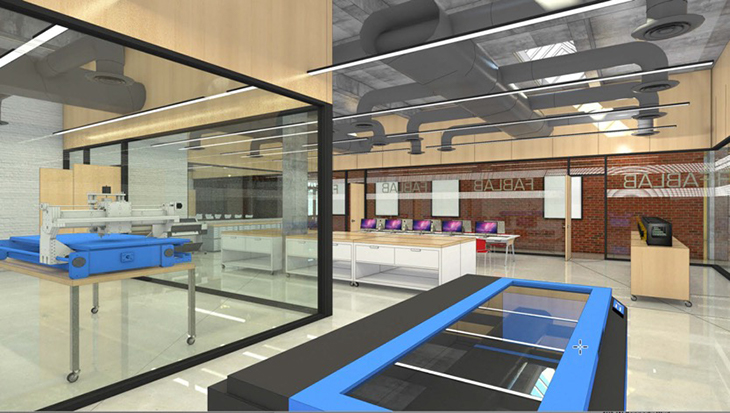
Most notably, the project will include construction of a digital fabrication lab (the Fab Lab) that will be an entrepreneurially focused, collaborative maker-space for students and faculty to turn their ideas and dreams into prototypes and products.
Art and design students — from the freshman year on — will have access to the Fab Lab, which at other universities is usually reserved for graduates in engineering, architecture or the arts. Additionally, the Fab Lab will be available for UTampa students from various majors.
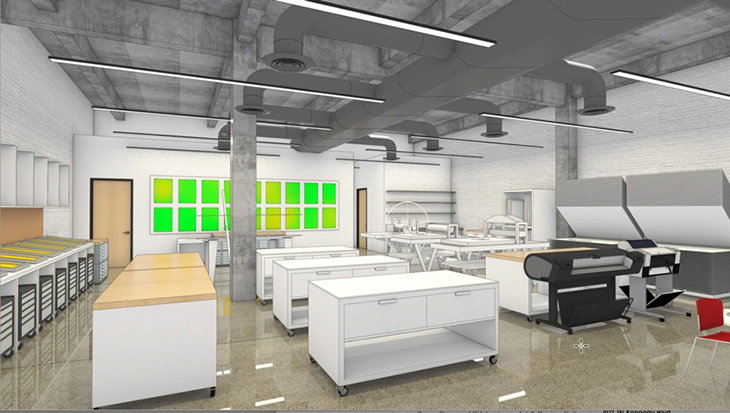
“According to Chris Valle, all of the rebuilt Bailey Arts Studios spaces will take their design cues from the edgy and collaborative vibe that is the standard in tech startups and other creative, professional spaces.
“Virtually anything can be created in a fab lab, even things we haven’t dreamed of yet,” said David Gudelunas, dean of the UTampa College of Arts and Letters. “Yet most fab labs are at large research institutions or affiliated with major think tanks, and it is an even smaller list of elite institutions that make these technologies available to undergraduate students.” Only 4 percent of colleges and universities in the country have a fab lab.
In addition to the Fab Lab, the rebuilt Bailey Arts Studio includes:
- A modernized, state-of-the art photography studio and darkroom complete with professional-grade lighting studio and staging areas as well as an environmentally friendly dark room.
- Two new high-tech classrooms that encourage interpersonal and technological engagement to support the growing graphic design major, and the digital arts generally.
- A re-imagined printmaking studio with safety and technological improvements that diversifies the printmaking capabilities and combines traditional processes with new emerging digital tools.
- Enhancements to the Scarfone/Hartley Gallery, one of Tampa’s premier art spaces.
According to Chris Valle, all of the rebuilt Bailey Arts Studios spaces will take their design cues from the edgy and collaborative vibe that is the standard in tech startups and other creative, professional spaces. “These new spaces are a physical manifestation of the vision of the art and design department and the College of Arts and Letters,” said Valle, chair and professor of art and design. “Art and design majors will have access to spaces that are as imaginative and aesthetically focused as they are. It is a perfect match.”
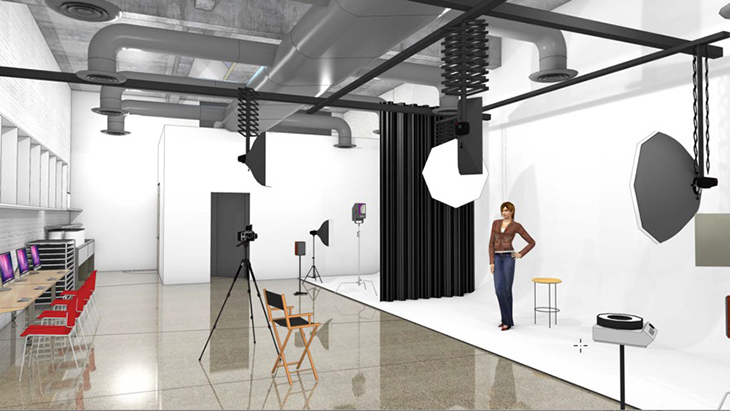
“Art and design majors will have access to spaces that are as imaginative and aesthetically focused as they are,” said Valle. “It is a perfect match.”
The Bailey Arts Studios, which is located on North Boulevard next to the Martinez Athletics Center, was originally developed in 2002 after a naming gift from the Bailey Family Foundation. The building is, and will remain, approximately 30,000 square feet.
Project architects are Eric Kreher and Bob Shumake, and the general contractor is Friedrich Watkins.
The rebuilding was paid for through individual gifts and University funds.
In alignment with UTampa’s commitment to environmental stewardship, the building will be designed and constructed to be a candidate for Leadership in Energy and Environmental Design (LEED) certification by the U.S. Green Building Council.
Completed Southard Family Building Photos
The University of Tampa’s Southard Family Building, which was built in 1962 on the Hillsborough River and has supported various administrative and academic functions over the years, underwent a major renovation. The renovation allows for significantly increased space for Career Services, classrooms, conference rooms and for a transformed post office.
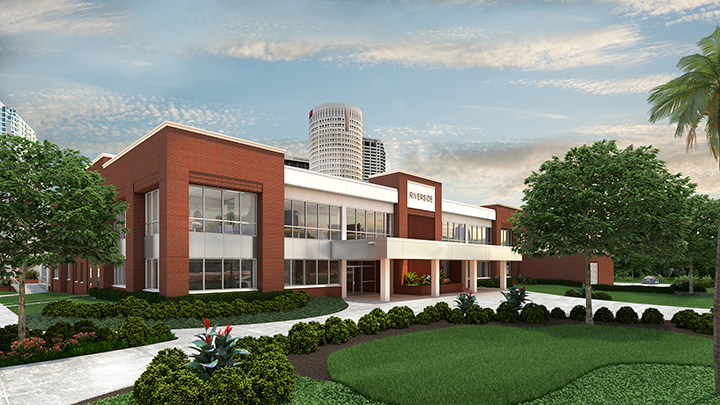
The previously named Riverside Center, which was a mix of single-story, story-and-a-half and two-story spaces, became two-story throughout, but will remain approximately the same footprint. The renovation added nearly 20,000 square feet for a total of 54,000 square feet.
Highlights of the renovation include:
- Career Services, which helps students transition from college to career, has an additional 5,000 square feet to incorporate spaces for placement services, including interviewing, corporate recruiter meetings, receptions, employer programs and numerous student programs to aid career exploration and job search. An adjacent multipurpose room opens onto a patio that overlooks the Hillsborough River.
- Classrooms and conference spaces account for an additional 4,500 square feet. The new building features 10 classrooms and conference rooms, which include two state-of-the-art language labs. Many of the classrooms will feature views of the Hillsborough River and downtown Tampa.
- UTampa’s post office was totally redesigned and modernized to account for current trends in student use, in which students do not receive significant amounts of first class mail, but do receive numerous packages via Amazon, USPS, FedEx, UPS, etc. In fact, last year post office staff handled 10,000 packages the first week of fall semester, and more than 100,000 during the academic year.
The new building also includes space for faculty offices to help keep pace with the rapid addition of new employee hires. The Office of Admissions’ presentation room was expanded, along with Admissions’ logistics space for managing mailings to prospective students. Development and University Relations, Human Resources and Communications and Public Affairs will also benefit from redesign and expanded spaces.
“The new Riverside Building will benefit the UTampa community in many ways,” said UTampa President Ronald Vaughn. “I believe students will especially benefit from the expansion of Career Services and the addition of classrooms and study spaces, and I think they will particularly enjoy a modernized, functional post office.”
The project architect is Andy Dohmen of Design Styles Architecture and the general contractor is Dave Tavlin of Crossroads Construction.
Construction of the building will be paid for through individual gifts and University funds.
In alignment with UTampa’s commitment to environmental stewardship, the building will be designed and constructed to be a candidate for Leadership in Energy and Environmental Design (LEED) certification of the U.S. Green Building Council.
The renovation also was be enhanced by landscaping, new sidewalks and outdoor, riverfront seating.
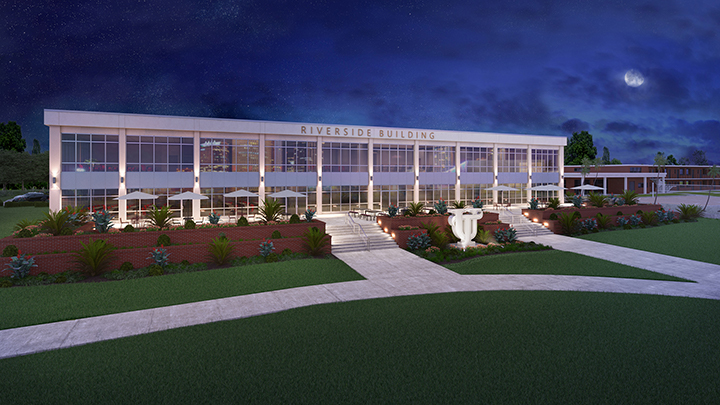
When it opened in May 1963 the Riverside Center was known as the Student Center and included a bookstore, dining center, library and student lounges.
It was built soon after the completion of the McKay and Smiley residence halls, when UTampa was attempting to build out a more complete campus, as well as manage its post-war enrollment increase. It was expanded in 1969, and the building last received a facelift in 2009.
Campus improvements completed in 2018 include the following:
For details and photos, visit Campus Construction 2018.
Campus improvements completed in 2017 include the following:
- Phase II of Palm Apartments
For details and photos, visit Campus Construction 2017.
Campus improvements completed in 2016 included the following:
- Fitness and Recreation Center
- McKay Hall
For details and photos, visit Campus Construction 2016.
Campus improvements that were completed in 2015 included the following:
- Phase one of Palm Apartments
- Music Room
- Innovation and Collaboration Building
For details and photos, visit Campus Construction 2015.
Campus improvements that were completed in 2014 included infrastructure updates to Plant Park.
Campus improvements completed in 2013 included the following:
- Aquatic Center
- North Walker Hall
- East Walker Hall
- West Kennedy Hall
- The Naimoli Family Softball Stadium
- Thompson Building
- Naimoli Family Athletic and Intramural Complex
For details and photos, visit the Campus Construction 2013 page.

